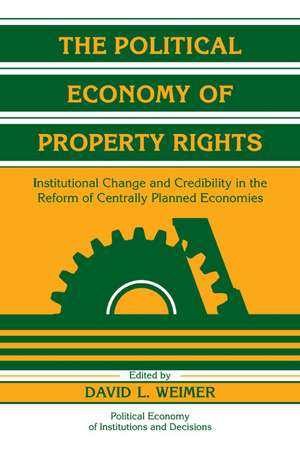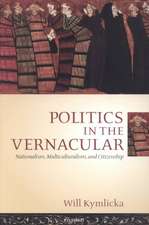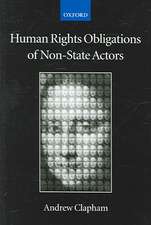The Political Economy of Property Rights: Institutional Change and Credibility in the Reform of Centrally Planned Economies: Political Economy of Institutions and Decisions
Editat de David L. Weimeren Limba Engleză Paperback – 16 feb 2011
| Toate formatele și edițiile | Preț | Express |
|---|---|---|
| Paperback (1) | 323.81 lei 43-57 zile | |
| Cambridge University Press – 16 feb 2011 | 323.81 lei 43-57 zile | |
| Hardback (1) | 674.17 lei 43-57 zile | |
| Cambridge University Press – 12 apr 1997 | 674.17 lei 43-57 zile |
Din seria Political Economy of Institutions and Decisions
-
 Preț: 235.99 lei
Preț: 235.99 lei -
 Preț: 231.82 lei
Preț: 231.82 lei -
 Preț: 177.53 lei
Preț: 177.53 lei -
 Preț: 211.85 lei
Preț: 211.85 lei -
 Preț: 200.87 lei
Preț: 200.87 lei -
 Preț: 306.68 lei
Preț: 306.68 lei -
 Preț: 208.16 lei
Preț: 208.16 lei -
 Preț: 133.60 lei
Preț: 133.60 lei -
 Preț: 295.55 lei
Preț: 295.55 lei -
 Preț: 236.43 lei
Preț: 236.43 lei -
 Preț: 228.38 lei
Preț: 228.38 lei -
 Preț: 265.11 lei
Preț: 265.11 lei -
 Preț: 281.49 lei
Preț: 281.49 lei -
 Preț: 285.37 lei
Preț: 285.37 lei -
 Preț: 279.98 lei
Preț: 279.98 lei - 14%
 Preț: 773.75 lei
Preț: 773.75 lei -
 Preț: 233.38 lei
Preț: 233.38 lei -
 Preț: 247.41 lei
Preț: 247.41 lei -
 Preț: 203.12 lei
Preț: 203.12 lei -
 Preț: 230.33 lei
Preț: 230.33 lei -
 Preț: 286.69 lei
Preț: 286.69 lei - 14%
 Preț: 790.57 lei
Preț: 790.57 lei -
 Preț: 265.32 lei
Preț: 265.32 lei - 11%
 Preț: 554.15 lei
Preț: 554.15 lei -
 Preț: 287.07 lei
Preț: 287.07 lei - 11%
 Preț: 700.20 lei
Preț: 700.20 lei -
 Preț: 273.13 lei
Preț: 273.13 lei -
 Preț: 459.84 lei
Preț: 459.84 lei -
 Preț: 280.35 lei
Preț: 280.35 lei -
 Preț: 260.11 lei
Preț: 260.11 lei - 11%
 Preț: 640.30 lei
Preț: 640.30 lei -
 Preț: 286.89 lei
Preț: 286.89 lei -
 Preț: 247.80 lei
Preț: 247.80 lei - 11%
 Preț: 691.81 lei
Preț: 691.81 lei -
 Preț: 287.48 lei
Preț: 287.48 lei - 11%
 Preț: 641.80 lei
Preț: 641.80 lei - 11%
 Preț: 635.32 lei
Preț: 635.32 lei -
 Preț: 271.01 lei
Preț: 271.01 lei -
 Preț: 265.70 lei
Preț: 265.70 lei -
 Preț: 227.83 lei
Preț: 227.83 lei
Preț: 323.81 lei
Nou
Puncte Express: 486
Preț estimativ în valută:
61.97€ • 64.46$ • 51.16£
61.97€ • 64.46$ • 51.16£
Carte tipărită la comandă
Livrare economică 14-28 aprilie
Preluare comenzi: 021 569.72.76
Specificații
ISBN-13: 9780521180702
ISBN-10: 0521180708
Pagini: 384
Dimensiuni: 152 x 229 x 22 mm
Greutate: 0.56 kg
Editura: Cambridge University Press
Colecția Cambridge University Press
Seria Political Economy of Institutions and Decisions
Locul publicării:New York, United States
ISBN-10: 0521180708
Pagini: 384
Dimensiuni: 152 x 229 x 22 mm
Greutate: 0.56 kg
Editura: Cambridge University Press
Colecția Cambridge University Press
Seria Political Economy of Institutions and Decisions
Locul publicării:New York, United States
Cuprins
1. The political economy of property rights David L. Weimer; 2. Credible commitment and property rights: the role of strategic interaction between political and economic actors Daniel Diermeier, Joel Ericson, Timothy Frye, and Steven Lewis; 3. The political commitment to markets and marketization: comment on 'Credible commmitment and property rights' Barry R. Weingast; 4. Political determinants of the success of economic transition Nikolai Mikhailov; 5. Comment on 'Political determinants of the success of economic transition' Adam Przeworski; 6. Russian privatization and the problem of credible commitment Timothy Frye; 7. Three issues of credible commitment and Russian privatization John M. Litwack; 8. Legislative politics and the political economy of property rights in post-Communist Russia Brendan Kiernan and Francis X. Bell; 9. Commitment, coordination, and the demise of the post-Communist parliament in Russia Steven S. Smith; 10. Private firms, city governments, and arbitration: enforcing economic legality in St. Petersburg Jole Meyer Ericson; 11. Comment on 'Private firms, city governments, and arbitration: enforcing economic legality in St. Petersburg' Anthony Jones; 12. Property rights and institutional change in the Czech and Slovac Republics Mariusz Mark Dobek; 13. Comment on 'Property rights and institutional change in the Czech and Slovac Republics' Sharon Wolchik; 14. Institutional structures, labor interests, and evolving privatization bargains in Poland Lorene Allio; 15. Comment on 'Institutional structures, labor interests, and evolving privatization bargains in Poland' Bartlomeij Kaminski; 16. Privatization as institutional change in Hungary László Urbán; 17. Comment on 'Privatization as institutional change in Hungary' Kálmán Mizsei; 18. Marketization and government credibility in Shanghai: federalist and local corporatist explanations Steven Lewis; 19. Federalist and corporatist theories: a comment on an empirical test Victor Nee; 20. Learning about the economy: property rights and the collapse of the East German industrial economy Hannes Wittig; 21. Misinformation, insecure property rights, and the collapse of the East German economy Susanne Lohmann; 22. Post-Communist privatization as a test of theories of institutional change Lorene Allio, Mariusz Mark Dobek, Nikolia Mikhailov, and David L. Weimer; 23. Explaining the complexity of institutional change Jack Knight and Douglass C. North.
Recenzii
"...recommended to anyone dealing with privatization strategies in the transformation economies or with the political economy of institutional change." Thomas Wagner, Journal of Institutional & Theoretical Economics
"...nothing could be more than a book on the interaction between the political insitutions of democracy and economic transformation. IThe Political Economy of Property Rights was the result of comparative studies made by the respective country specialists." Slavic Reviews
"This volume examines why the countries have followed the policy courses that they did. Weimer describes the basic principles of property rights, in particular, security against appropriation by others, emphasizes the close connection between private property and democracy, and then summarizes the other contributions. ...a major step toward developing such a full model, as it confronts the modesl with many empirical cases. We can then see what data and techiniques are most successful in testin the theory." Kenneth Koford, Journal of Comparative Economics
"...nothing could be more than a book on the interaction between the political insitutions of democracy and economic transformation. IThe Political Economy of Property Rights was the result of comparative studies made by the respective country specialists." Slavic Reviews
"This volume examines why the countries have followed the policy courses that they did. Weimer describes the basic principles of property rights, in particular, security against appropriation by others, emphasizes the close connection between private property and democracy, and then summarizes the other contributions. ...a major step toward developing such a full model, as it confronts the modesl with many empirical cases. We can then see what data and techiniques are most successful in testin the theory." Kenneth Koford, Journal of Comparative Economics
Descriere
A 1997 investigation of the transformation of property rights in post-communist countries and China.
















